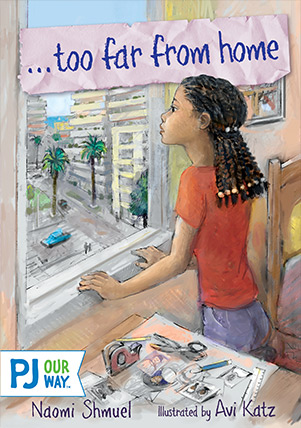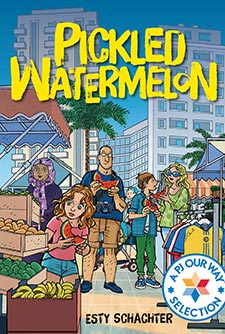Too Far From Home
When her mom gets a big promotion, Meskerem must leave her beloved home and start school in a new town far away. As if that’s not bad enough, now she’s the only kid of color in the entire fifth grade! Will she ever fit in and make friends?
Average Rating
( hint: Login to leave a review! )
90 Reviews
Leave Review
What the Book is About
Jewish Content & Values
Positive Role Models
Content Advisory
Talk it Over!
More for You
What the Book is About
Meskerem’s mother just got a big promotion at work, so her family must relocate from Katzin, her small hometown, to Hertzliya, a large city in central Israel. Leaving her beloved grandmother and childhood friends behind, Meskerem begins fifth grade at the local school. Meskerem’s father emigrated from America, while her mom was born in Ethiopia. Although Meskerem is a native Israeli, the other kids immediately assume that she’s one of the new immigrants who just arrived on Operation Solomon, the much-publicized airlift evacuation of Ethiopian Jews from the Sudan. Their insensitive and racist comments make Meskerem feel ashamed and confused about her heritage; thus, she impulsively declares that she’s American. Eventually, she learns to appreciate and take pride in her rich and diverse Jewish, Ethiopian, and American identity while earning her classmates’ respect and friendship. This sweet book is translated from the Hebrew and won the Anderson Award as well as a commendation by the Zeev prize committee in Israel.
Jewish Content & Values
Meskerem’s father is American, and her mother is from Ethiopia. Meskerem and her sisters Lemlem and Abeva were born in Israel and this book does a beautiful job describing American, Ethiopian, and Israeli Jewish traditions and customs. Meskerem’s Grandpa Dave sits shiva for her Grandma Rose and sends his granddaughters American clothes for Hanukkah; Meskerem travels the length of Israel on the bus, meeting an Israeli soldier and passing cities such as Tiberias and Tel Aviv; and, for Meskerem’s bat mitzvah, she receives a gold Magen David (Star of David) that once was her Ethiopian grandfather’s.
Positive Role Models
- Meskerem’s grandmother, Mitaeh, is a very positive influence on her life. She and Meskerem are very close, and when she hears about Meskerem’s troubles at school, she shares a traditional Ethiopian folk tale, inspiring her granddaughter to tell her classmates the truth.
- Over the course of the story, Meskerem finds the courage to stand up for herself and remain proud of her mixed Jewish heritage.
Content Advisory
The story describes some of the difficulties Ethiopian Jews encountered as they walked across the Sudan while en route to Israel. Meskerem’s grandmother was separated from her daughter for years, and her grandfather was shot by robbers. No graphic details are offered, and, although tragic, these stories are related in an age appropriate manner.
Talk it Over!
When Meskerem’s mother approached the podium to present her research data at the conference, the Chairman of Education introduced her as the interpreter instead of the education expert. What do you think about the way she responded? How would you have responded in a situation like that?
More for You
When they arrived in Israel, most Jewish Ethiopian immigrants had no formal education and could not even read or write in their native language, Amharic. Although over 40 years have passed since the first Ethiopian Aliyah to Israel, and more than a third of the community are currently native-born sabras (Israelis), Israel is still struggling with the enormous cultural transition and integration of this community. Despite clear challenges, including racism; poverty; and over-policing, there have also been many successes, such as the establishment of the national Sigd holiday; a special memorial on Mt. Hertzl dedicated to those who perished on the journey across Sudan; and the impressive accomplishments of the many notable Ethiopian Israelis integrated into the fabric of Israeli society.
What the Book is About
What the Book is About
Meskerem’s mother just got a big promotion at work, so her family must relocate from Katzin, her small hometown, to Hertzliya, a large city in central Israel. Leaving her beloved grandmother and childhood friends behind, Meskerem begins fifth grade at the local school. Meskerem’s father emigrated from America, while her mom was born in Ethiopia. Although Meskerem is a native Israeli, the other kids immediately assume that she’s one of the new immigrants who just arrived on Operation Solomon, the much-publicized airlift evacuation of Ethiopian Jews from the Sudan. Their insensitive and racist comments make Meskerem feel ashamed and confused about her heritage; thus, she impulsively declares that she’s American. Eventually, she learns to appreciate and take pride in her rich and diverse Jewish, Ethiopian, and American identity while earning her classmates’ respect and friendship. This sweet book is translated from the Hebrew and won the Anderson Award as well as a commendation by the Zeev prize committee in Israel.
Jewish Content & Values
Jewish Content & Values
Meskerem’s father is American, and her mother is from Ethiopia. Meskerem and her sisters Lemlem and Abeva were born in Israel and this book does a beautiful job describing American, Ethiopian, and Israeli Jewish traditions and customs. Meskerem’s Grandpa Dave sits shiva for her Grandma Rose and sends his granddaughters American clothes for Hanukkah; Meskerem travels the length of Israel on the bus, meeting an Israeli soldier and passing cities such as Tiberias and Tel Aviv; and, for Meskerem’s bat mitzvah, she receives a gold Magen David (Star of David) that once was her Ethiopian grandfather’s.
Positive Role Models
Positive Role Models
- Meskerem’s grandmother, Mitaeh, is a very positive influence on her life. She and Meskerem are very close, and when she hears about Meskerem’s troubles at school, she shares a traditional Ethiopian folk tale, inspiring her granddaughter to tell her classmates the truth.
- Over the course of the story, Meskerem finds the courage to stand up for herself and remain proud of her mixed Jewish heritage.
Content Advisory
Content Advisory
The story describes some of the difficulties Ethiopian Jews encountered as they walked across the Sudan while en route to Israel. Meskerem’s grandmother was separated from her daughter for years, and her grandfather was shot by robbers. No graphic details are offered, and, although tragic, these stories are related in an age appropriate manner.
Talk it Over!
Talk it Over!
When Meskerem’s mother approached the podium to present her research data at the conference, the Chairman of Education introduced her as the interpreter instead of the education expert. What do you think about the way she responded? How would you have responded in a situation like that?
More for You
More for You
When they arrived in Israel, most Jewish Ethiopian immigrants had no formal education and could not even read or write in their native language, Amharic. Although over 40 years have passed since the first Ethiopian Aliyah to Israel, and more than a third of the community are currently native-born sabras (Israelis), Israel is still struggling with the enormous cultural transition and integration of this community. Despite clear challenges, including racism; poverty; and over-policing, there have also been many successes, such as the establishment of the national Sigd holiday; a special memorial on Mt. Hertzl dedicated to those who perished on the journey across Sudan; and the impressive accomplishments of the many notable Ethiopian Israelis integrated into the fabric of Israeli society.





